
Ukraine maintains a significant positive trade balance with a number of key partners, which partially offsets the deficit in relations with China and EU countries.
The largest surplus in the first half of 2025 was recorded in trade with Egypt — $605.0 million. Spain ranks second with a balance of $515.3 million, followed by the Republic of Moldova — $448.4 million. Positive dynamics are also observed in relations with the Netherlands ($357.6 million), Algeria ($276.6 million), and Lebanon ($243.8 million).
Ukraine also has a high trade surplus with Iraq ($189.0 million), Libya ($133.6 million), Saudi Arabia ($128.4 million), and Kazakhstan ($113.6 million).
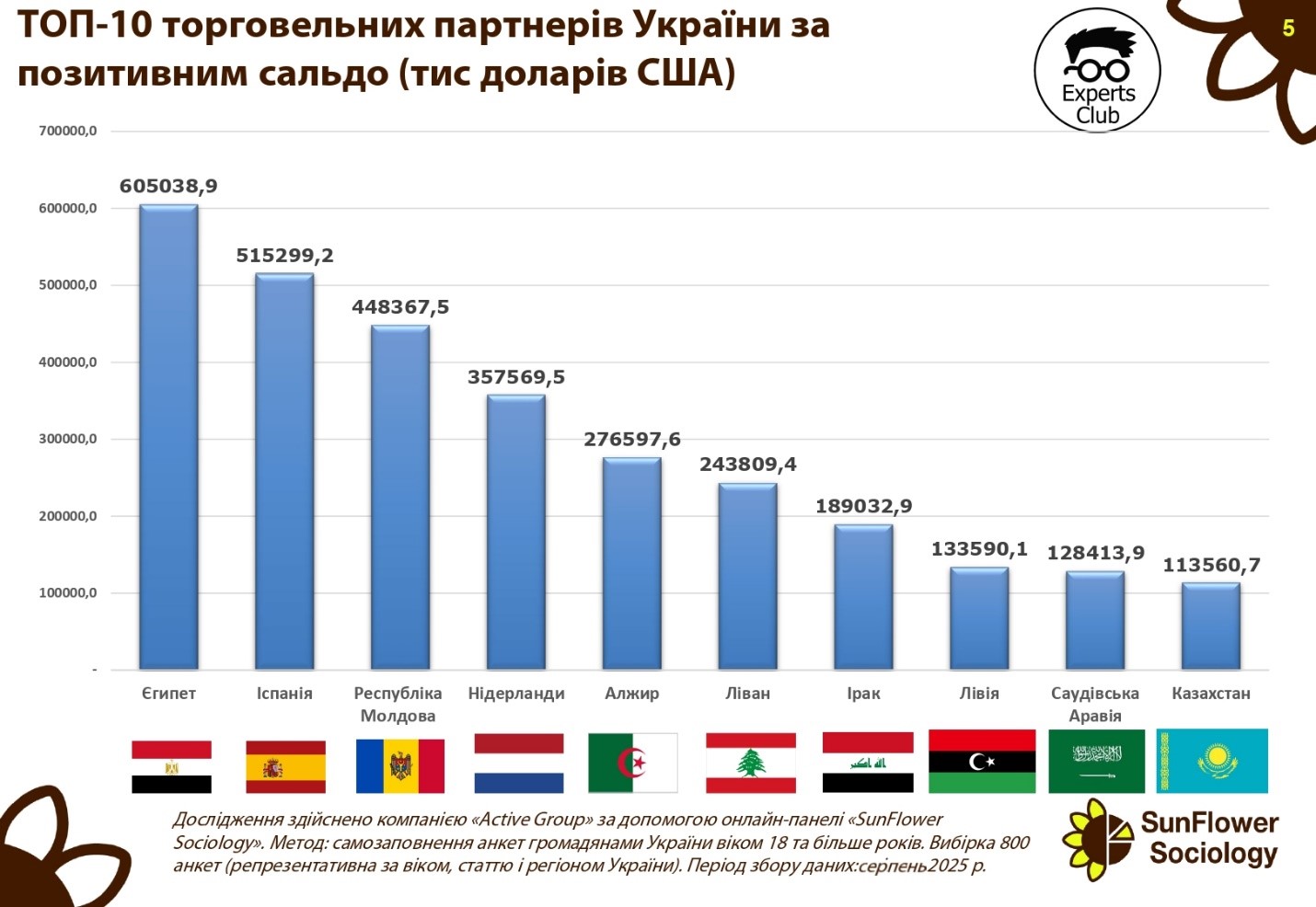
“The positive trade balance indicates that Ukraine is capable of competing effectively in international markets, especially in the agricultural sector and metallurgy. At the same time, it should be borne in mind that these markets are vulnerable to changes in the global economic situation, price fluctuations, and political factors,” emphasized Maksim Urakin, founder of Experts Club and economist.
According to him, maintaining a positive balance in relations with the countries of the Middle East and North Africa is a key element of Ukraine’s foreign trade strategy.
“Egypt, Spain, and the countries of the Arab world are stable importers of Ukrainian agricultural products. This is a strategic direction that needs to be developed further, as it creates a safety cushion for the economy against the backdrop of significant import costs,” Urakyn emphasized.
Analysts note that consolidating positions in the African and Middle Eastern markets could become a long-term factor in strengthening Ukraine’s foreign economic balance.
Agricultural exports, ALGERIA, ECONOMY, EGYPT, EXPERTS CLUB, FOREIGN TRADE, IRAQ, KAZAKHSTAN, LEBANON, LIBYA, MOLDOVA, NETHERLANDS, positive balance, SAUDI ARABIA, SPAIN, UKRAINE, МАКСИМ УРАКИН
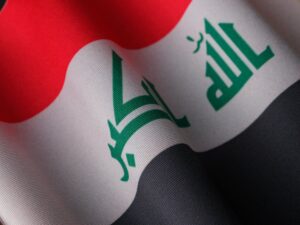
More than half of Ukrainians express a neutral attitude toward Iraq, but at the same time, a significant proportion of respondents rated the country negatively. This is evidenced by the results of a survey conducted by Active Group in cooperation with the Experts Club think tank.
According to the study, 53.7% of respondents said their attitude toward Iraq is neutral. At the same time, 37.0% said they have a negative attitude (11.3% — completely negative, 25.7% — mostly negative). Only 5.7% of Ukrainians expressed positive views (1.7% — completely positive, 4.0% — mostly positive). Another 3.7% of respondents said they were not familiar with the country.
“Ukrainians associate Iraq primarily with wars, instability, and crises, which significantly affects their perception of the country. At the same time, more than half of the respondents demonstrate a neutral position, which indicates the absence of a clear personal assessment,” commented Alexander Pozniy, head of Active Group.
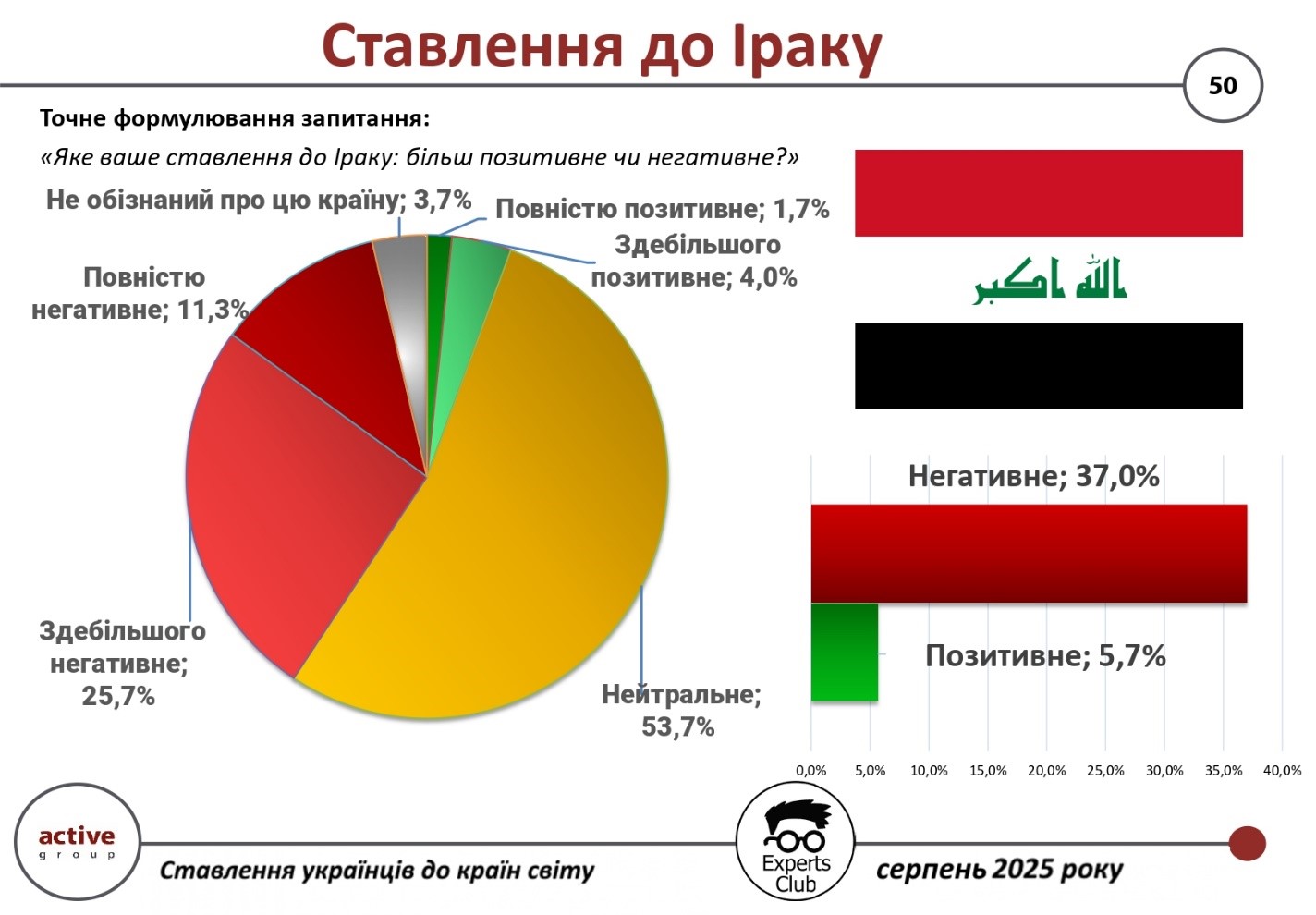
Maksim Urakin, co-founder of Experts Club, emphasized the specifics of economic relations.
“Despite the fact that some of our fellow citizens may confuse Iran and Iraq, the latter is one of our most profitable trading partners. Ukraine’s trade turnover with Iraq in January-August 2025 amounted to $189.3 million. At the same time, exports from Ukraine amounted to $189.2 million, while imports amounted to only $0.16 million. This structure creates a significant positive balance of over $189 million, making Iraq primarily a market for Ukrainian products rather than a source of imports,” Urakin emphasized.
Thus, Ukrainians’ attitude toward Iraq remains neutral overall, with a high proportion of negative assessments, while economic relations are one-sided and focused on Ukrainian exports.
The full video can be viewed at: https://www.youtube.com/watch?v=YgC9TPnMoMI&t
You can subscribe to the Experts Club YouTube channel here: https://www.youtube.com/@ExpertsClub
ACTIVE GROUP, EXPERTS CLUB, IRAQ, Pozniy, SOCIOLOGY, TRADE, UKRAINE, URAKIN

Growing domestic demand combined with huge oil reserves will lead to a significant increase in refining capacity in the Middle East, according to industry publication Offshore Technology, citing a study by GlobalData Energy.
“The Middle East is expected to be a key region in terms of growth in traditional refinery capacity worldwide, accounting for more than a quarter of the total increase by 2030. This growth is driven by large-scale projects, particularly in Iran and Iraq. Both countries are using their vast oil reserves to expand their oil refining infrastructure in an effort to meet growing domestic demand, reduce oil product imports, and strengthen their export capabilities,” the experts write.
In their opinion, Iran will dominate in terms of refinery commissioning, accounting for 40% of the total. The country plans to commission a total of 15 new and expanded projects. The largest of these is Jask II, with a declared capacity of 6,000 barrels per day. The project is currently in the preliminary design stage and is expected to be launched in 2028.
Oil refining capacity in Iraq is expected to increase by 1.9 million bpd. New projects are leading the way in terms of commissioning rates in the country, accounting for 65% of the total expected volume by 2030. About 28% of these are under construction. One of the significant projects, Basra II, involves increasing production by 300 bpd in 2027.
Oman ranks third in terms of oil refining capacity growth, with an increase of 695,000 bpd by 2030.

Active Group and Experts Club have conducted a joint study on the attitudes of Ukrainians towards the countries of East Asia and the Middle East. The study was presented at the Interfax-Ukraine news agency in June 2024. The research was presented by Maksym Urakin and Oleksandr Poznyi. The results of the study are as follows:
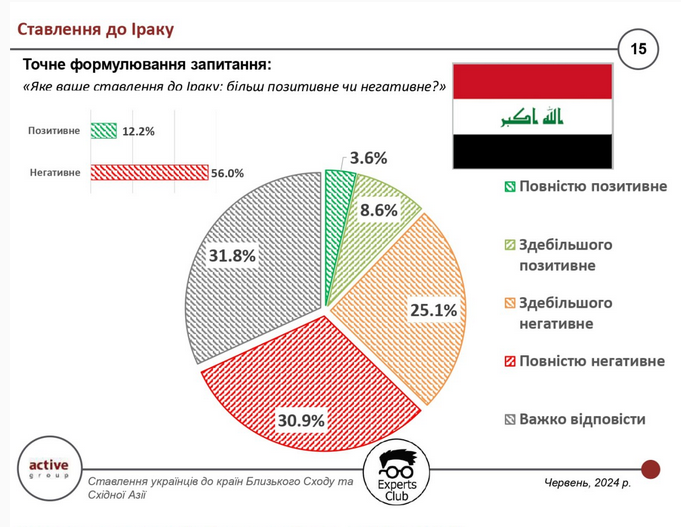
The results of the survey are as follows:
Completely positive – 3.6
Mostly positive – 8.6
Mostly negative – 25.1 %.
Completely negative – 30.9%.
Difficult to answer – 31.8%.
Positive – Negative -43.8
On December 16, 1992, diplomatic relations between Ukraine and Iraq were established
The joint research by Active Group and Experts Club on the attitudes of Ukrainians towards the countries of East Asia and the Middle East was conducted in April-May 2024. It covers such countries as Turkey, Iran, Israel, Egypt, Jordan, Saudi Arabia, UAE, Afghanistan, Pakistan, Azerbaijan, Uzbekistan, Turkmenistan, Kyrgyzstan, Tajikistan, Kazakhstan, Georgia, Armenia, India, China, Republic of Korea, DPRK, Japan, Vietnam, Indonesia, Syria, and Iraq. Full information on the research is available on the website of the Club of Experts at
https://expertsclub.eu/cpilne-doslidzhennya-kompaniyi-active-group-ta-experts-club-shhodo-stavlennya-ukrayincziv-do-krayin-shidnoyi-aziyi-ta-blyzkogo-shodu/
Video – https://interfax.com.ua/news/video/993142.html
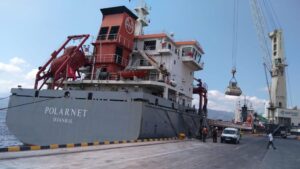
Six vessels carrying nearly 154,000 tonnes of foods departed from Ukrainian ports on Thursday after receiving approval from the Joint Coordination Center (JCC).
“The Joint Coordination Center (JCC) reports that six vessels left Ukrainian ports today [on October 13] carrying a total of 153,505 metric tonnes of grain and other foods under the Black Sea Grain Initiative,” the center said.
In particular, the Wei He vessel is heading to China with 62,860 tonnes of sunflower meal on board, the Marlen bulker is carrying 33,000 tonnes of sunflower oil to Iraq, the Irmgard is carrying 30,817 tonnes of rapeseed to Germany, and the Ak Hamza is carrying 7,000 tonnes of corn to Lebanon.
Another two vessels – the Dignity (14,000 tonnes of corn) and the Yaf S (5,828 tonnes of wheat) – are bound for Turkey.
“Grains that reach a destination may go through processing and be transshipped to other countries,” the JCC said.
“As of October 13, the total tonnage of grain and other foodstuffs exported from the three Ukrainian ports is 7,363,704 metric tonnes. A total of 666 voyages (335 inbound and 331 outbound) have been enabled so far,” the center said.
The United Nations, Russia, Turkey and Ukraine signed a document in Istanbul on July 22 on opening a corridor to export grain from three Ukrainian ports – Chornomorsk, Odesa and Yuzhny.
CHINA, GERMANY, IRAQ, LEBANON, TURKEY, Ukrainian foods, VESSELS
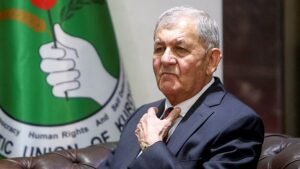
Latif Rashid on Thursday became the President of Iraq following a vote in Parliament, which marked the beginning of the formation of the Iraqi government – a year after the parliamentary elections in the country, Rudaw reports.
Rashid beat his opponent, former Iraqi President Barham Saleh, by 63 votes. In total, 162 deputies voted for Rashid.
Mohammed al-Sudani, who is running for the new prime minister, is expected to form a government within 30 days.
Previously, Rashid served as the Minister of Water Resources of Iraq, and was also a representative of the Patriotic Union of Kurdistan party.
Protests against corruption in Iraq caused early parliamentary elections in the country in October 2021. However, elected parliamentarians could not form a government due to disagreements between political blocs over the mechanisms for its formation.